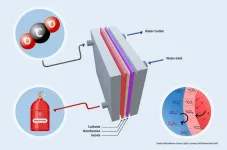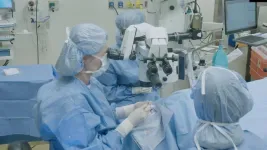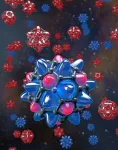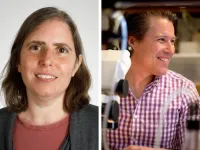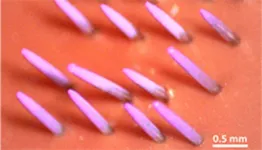(Press-News.org) Organisms across the globe are facing unprecedented levels of stress from climate change, habitat destruction, and many other human-driven changes to the environment. Predicting and mitigating the effects of this increasing stress on organisms, and the environmental services on which we depend, requires understanding why some species can exist in a wide range of environments while others exist in only a few habitats.
In the scientific world of ecology, researchers often try to sort organisms on our planet into two categories: specialists and generalists. Generalists can survive across a wide variety of environmental conditions and habitats, while specialists are more restricted or limited to specific conditions for survival. The panda bear, for example, feeds only on bamboo within a specific habitat. Not only is their habitat range-restricted, but so is their diet, and if the bamboo plant became extinct, panda bears might become extinct as well.
But what about the microbial world of unseen organisms found everywhere on Earth, from the human gut to the soil under our feet? Into which category do they fall?
To find the answer, a group of graduate and postdoctoral students in associate professor Michelle Afkhami’s biology lab at the University of Miami College of Arts and Sciences studied the DNA sequences of prokaryotes, a group of microbes that include all bacteria and archaea. The findings are in a recent study entitled, “Multidimensional specialization and generalization are pervasive in soil prokaryotes,” now available in the journal Nature Ecology & Evolution.
“The idea behind the project was to find out whether these microbes can exist within a narrow or broad range of conditions along many different environmental dimensions,” said Damian Hernandez, a former graduate student in Afkhami’s lab who is now a postdoc preparing for a biology fellowship with the National Science Foundation. “Specifically, we wanted to know whether microbes are typically multidimensional specialists, multidimensional generalists, or use different strategies on different environmental dimensions—and what effect that could have on their roles within communities.
“The environmental dimensions we used to determine whether the microbes are generalists or specialists were based on multiple environmental conditions in the soil in which they live, for example, leaf litter, temperature, water, and nutrients,” he added.
In a collaborative effort two years in the making, the team of students analyzed more than 200 soil samples collected by the National Ecological Observatory Network from sites across the United States. Of the over 1,200 prokaryotes examined, Hernandez and the team found something quite surprising. They found that the majority (90 percent) of the microbes were either multidimensional generalists or multidimensional specialists.
Essentially, if a microbe was a generalist across one environmental axis, it was almost always a generalist across all other axes; and if it was a specialist on one environmental axis, it specialized across all axes. In addition to providing important insight into how microbial communities are structured, this discovery provides some of the first evidence for multidimensional specialization and generalization in any type of organism.
“We found that microbes can be very restricted on where they can exist,” said Hernandez, who is the first author of the study. “The generalist microbes are very flexible and can withstand a wider range of conditions. But the specialist microbes are sensitive to many different environmental conditions because they are restricted on multiple environmental axes and thus any changes in the environment may hinder their survival.
“Hypothetically, if an ecosystem is structured by microbes that are specialists, then those ecosystems are more likely to be sensitive to environmental change,” he said.
Afkhami confirms that the findings present an interesting argument on how microbes can survive in a changing climate.
“As we learned from the study, microbes that are generalists can live across a wide range of habitats, and this can mean that those microbes may be resilient to climate change or habitat fragmentation because they are likely to tolerate changing environmental conditions. They are also very dominant within microbial communities,” she said.
In contrast, the team found that specialist microbes can be very susceptible to environmental change. Microbes categorized as specialists also appear to be important “community organizers” due to their high functionality within the microbial world. For example, the research team discovered that specialist microbes are more likely to be those that can promote plant growth, detoxify the soil, digest complex carbons in the soil, and add nutrients to the soil.
“This is very concerning because what we also learned in the study is that microbial specialists are highly connected within the microbial network and can be considered as keystone species for maintaining and driving the diversity and function of the microbiome,” said Afkhami. “In this study, we can start to understand—across a wider sense in the microbiome community—some of their biological functions, their roles in the microbial community, and how they will respond to global changes on the planet.”
END
Can soil microbes survive in a changing climate?
A new study out of the University of Miami College of Arts and Sciences examines the biology of the invisible world of soil microbes and how they might respond to global changes on the planet.
2023-08-18
ELSE PRESS RELEASES FROM THIS DATE:
Illinois Tech engineer spearheads research leading to groundbreaking green propane production method
2023-08-18
CHICAGO—August 18, 2023—A paper recently published in Nature Energy based on pioneering research done at Illinois Institute of Technology reveals a promising breakthrough in green energy: an electrolyzer device capable of converting carbon dioxide into propane in a manner that is both scalable and economically viable.
As the United States races toward its target of net-zero greenhouse gas emissions by 2050, innovative methods to reduce the significant carbon dioxide emissions from electric power and industrial sectors ...
Cell therapy that repairs cornea damage with patient’s own stem cells achieves positive phase I trial results
2023-08-18
BOSTON– A team led by researchers from Mass Eye and Ear, a member of Mass General Brigham, reports the results of a phase I trial of a revolutionary stem cell treatment called cultivated autologous limbal epithelial cell transplantation (CALEC), which was found to be safe and well-tolerated over the short term in four patients with significant chemical burns in one eye. According to the study published August 18 in Science Advances, the patients who were followed for 12 months experienced restored cornea surfaces — two were able to undergo a corneal transplant and two reported significant improvements in vision without additional treatment.
While ...
A new way to identify chiral molecules with light could vastly improve detection efficiency
2023-08-18
Chiral molecules are those that have two versions that are mirror images, like our right and left hands. These molecules have the same structure but different properties when they interact with other molecules, including those inside our bodies. This is important for example in drug molecules, where only the right- or left-handed version may have the desired effect.
Detecting and quantifying the chirality of matter however has been difficult. Current methods using a form of light that produces a (right- or left-twisting) helix ...
A new “spin” on ergodicity breaking
2023-08-18
In a recent Science paper, researchers led by JILA and NIST Fellow Jun Ye, along with collaborators JILA and NIST Fellow David Nesbitt, scientists from the University of Nevada, Reno, and Harvard University, observed novel ergodicity-breaking in C60, a highly symmetric molecule composed of 60 carbon atoms arranged on the vertices of a “soccer ball” pattern (with 20 hexagon faces and 12 pentagon faces). Their results revealed ergodicity breaking in the rotations of C60. Remarkably, they ...
UH leading multi-institutional program to provide research opportunities to postbaccalaureates
2023-08-18
With the juggling act of maintaining grades while also keeping a job, undergraduate students pursuing STEM degrees often graduate without any research experience, despite the benefits that research can have on their careers.
To provide more graduates from diverse backgrounds with research and mentoring experiences, Rebecca Zufall and Richard Meisel, associate professors of biology and biochemistry at the University of Houston’s College of Natural Sciences and Mathematics, are leading a multi-institutional program that will provide ...
Scientists develop efficient spray technique for bioactive materials
2023-08-18
Rutgers scientists have devised a highly accurate method for creating coatings of biologically active materials for a variety of medical products. Such a technique could pave the way for a new era of transdermal medication, including shot-free vaccinations, the researchers said.
Writing in Nature Communications, researchers described a new approach to electrospray deposition, an industrial spray-coating process. Essentially, Rutgers scientists developed a way to better control the target region within a spray zone as well as the electrical properties of microscopic ...
Public may overestimate pushback against controversial research findings
2023-08-18
Controversial research can put people on the defensive and may even lead to calls to censor findings that conflict with a particular ideological perspective. However, a pair of studies published in Psychological Science, by authors Cory J. Clark (University of Pennsylvania), Maja Graso (University of Groningen), Ilana Redstone (University of Illinois Urbana-Champaign), and Philip E. Tetlock (University of Pennsylvania), suggest a tendency to overestimate the risk that research findings will fuel public support for harmful actions.
Harmful actions related to research findings, according ...
UArizona Cancer Center study connects research scientists with the communities they serve
2023-08-18
A new study by University of Arizona Cancer Center researchers piloted a unique outreach strategy to foster dialogue between basic scientists and community members to demystify basic science research and facilitate culturally tailored approaches to address health disparities of vulnerable communities.
The paper, published in the journal Cancer Causes and Control, analyzes the processes, experiences and lessons learned during the establishment of the Research Outreach for Southern Arizona, or ROSA, program.
“Basic science research is critical ...
JMIR AI now included in the Directory Of Open Access Journals (DOAJ)
2023-08-18
(Toronto, August 18, 2023) JMIR Publications is happy to announce that JMIR AI has been accepted and indexed with the Directory of Open Access Journals (DOAJ). The DOAJ applies strict criteria to review and index Open Access journals, which include licensing and copyright criteria, quality control processes, journal website technical and usability setups, and editorial evaluation.
JMIR AI (JMIR AI ISSN 2817-1705, Editors-in-Chief: Khaled El Emam, PhD and Bradley Malin, PhD) is a new journal (launched in 2022) focusing on the applications of AI in health settings. This includes contemporary developments as well as historical examples, with an emphasis on sound ...
Prostate cancer drug shows promise against COVID
2023-08-18
At the outset of the COVID pandemic, men appeared to suffer higher rates of severe illness and death, leading researchers to suspect a link between androgen receptors—which bind to hormones like testosterone--and SARS-CoV-2 viral infection.
This observation spurred Michigan Medicine researchers to look into a drug in development to treat prostate cancer called proxalutamide, which works by blocking an enzyme called TMPRSS2 (transmembrane protease, serine 2) that is regulated by androgen receptors, as a potential therapeutic for COVID.
“We were already studying TMPRSS2 as part of the key gene driver ...
LAST 30 PRESS RELEASES:
Yale study challenges notion that aging means decline, finds many older adults improve over time
Korean researchers enable early detection of brain disorders with a single drop of saliva!
Swipe right, but safer
Duke-NUS scientists identify more effective way to detect poultry viruses in live markets
Low-intensity treadmill exercise preconditioning mitigates post-stroke injury in mouse models
How moss helped solve a grave-robbing mystery
How much sleep do teens get? Six-seven hours.
Patients regain weight rapidly after stopping weight loss drugs – but still keep off a quarter of weight lost
GLP-1 diabetes drugs linked to reduced risk of addiction and substance-related death
Councils face industry legal threats for campaigns warning against wood burning stoves
GLP-1 medications get at the heart of addiction: study
Global trauma study highlights shared learning as interest in whole blood resurges
Almost a third of Gen Z men agree a wife should obey her husband
Trapping light on thermal photodetectors shatters speed records
New review highlights the future of tubular solid oxide fuel cells for clean energy systems
Pig farm ammonia pollution may indirectly accelerate climate warming, new study finds
Modified biochar helps compost retain nitrogen and build richer soil organic matter
First gene regulation clinical trials for epilepsy show promising results
Life-changing drug identified for children with rare epilepsy
Husker researchers collaborate to explore fear of spiders
Mayo Clinic researchers discover hidden brain map that may improve epilepsy care
NYCST announces Round 2 Awards for space technology projects
How the Dobbs decision and abortion restrictions changed where medical students apply to residency programs
Microwave frying can help lower oil content for healthier French fries
In MS, wearable sensors may help identify people at risk of worsening disability
Study: Football associated with nearly one in five brain injuries in youth sports
Machine-learning immune-system analysis study may hold clues to personalized medicine
A promising potential therapeutic strategy for Rett syndrome
How time changes impact public sentiment in the U.S.
Analysis of charred food in pot reveals that prehistoric Europeans had surprisingly complex cuisines
[Press-News.org] Can soil microbes survive in a changing climate?A new study out of the University of Miami College of Arts and Sciences examines the biology of the invisible world of soil microbes and how they might respond to global changes on the planet.
